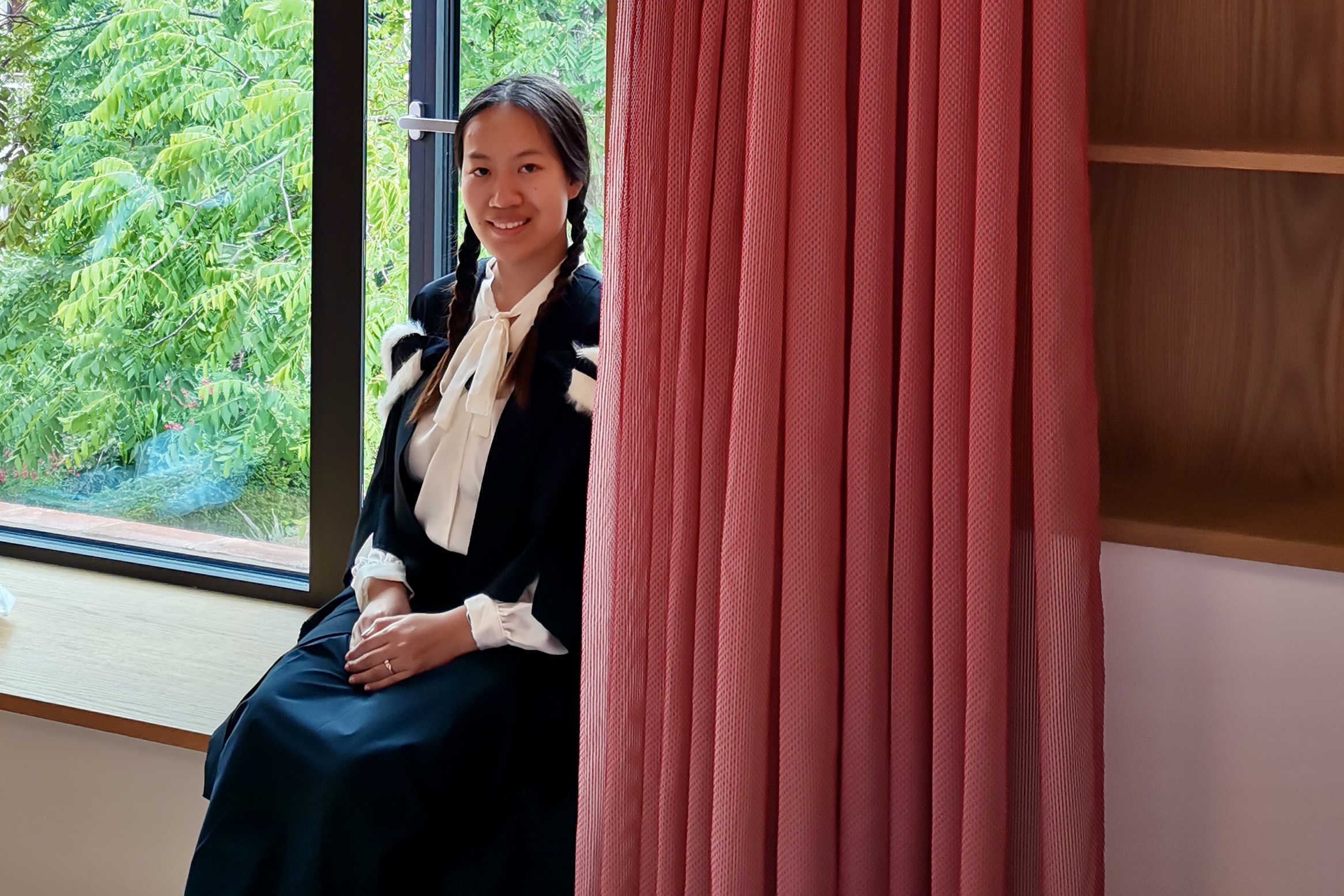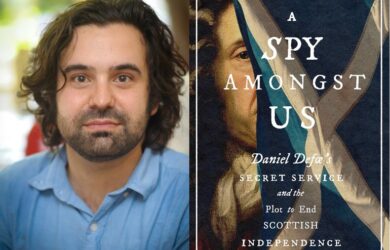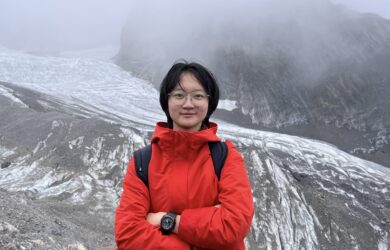
Zhi-Yu Chen talks about her research into cross-cultural exchange between Chinese migrants and other Southeast Asian communities between 1500 and 1800 despite few written records.
Zhi-Yu Chen’s research is like piecing together a jigsaw puzzle. Zhi-Yu is interested in the cross-cultural exchange of scientific knowledge between Chinese migrants and other communities in Southeast Asia between 1500 and 1800, for instance, the transmission of attitudes and approaches to understanding and utilising nature. However, few words have survived from the migrants themselves.
“As far as I am aware, there is currently no intellectual history written for this remarkable community, who have only been noticed by historians for their economic or political importance,” says Zhi-Yu [2023], who is doing a PhD in History and Philosophy of Science. “They feature frequently in European writings about journeys in Southeast Asia, but there are few first-hand accounts from Chinese migrants themselves in this period, partly because what they were doing was considered illegal in China at the time. So, I have often had to ‘read against the grain’, beyond prejudiced rhetoric in European archives, to uncover the reality of intellectual exchanges. I am also cross-contextualising with materials from the Chinese province that most of the migrants hailed from – Fujian – to better understand their intellectual milieu.”
She adds: “In short, I am trying to write a history for a group of people who left behind very few materials for historians to work with. My thesis argues that, despite that, we should try and write a history for them,” she says, “because they were more than just traders: they collaborated with a diverse range of communities in a politically contentious region, bringing new ideas and blending them with knowledge traditions they encountered in Southeast Asia to create new ways of knowing the natural world.”
For Zhi-Yu, recovering lost voices has been both her method and her motivation. In seeking to uncover how knowledge and ideas travel across borders, Zhi-Yu hopes that her research will not only illuminate forgotten histories of collaboration and contestation but also remind us that the pursuit of knowledge and understanding has always been done through connection, not isolation.
Childhood
Zhi-Yu was born and raised in Xuzhou in Jiangsu province in the east of China. She cites her family background as one of the earliest inspirations for her to work on cross-cultural exchanges. Her home city sits at the intersection of four provinces, all with distinctive traditions and links to the rest of China. At home, she grew up hearing four different dialects – all from Jiangsu, but some mutually unintelligible from each other – and developed a curiosity about how culture can be both a force for connection and for estrangement.
Zhi-Yu was largely raised by her maternal grandparents, who nurtured her interest in and respect for “quotidian things and the stories behind them”. Her grandmother is a retired teacher of Chinese language and literature from the south of Jiangsu, who has always encouraged Zhi-Yu to read books and newspapers as well as merchants’ pamphlets from a young age and enchanted her with descriptions of life from decades ago, while Zhi-Yu experienced China as a country that was developed and had transformed rapidly through technocratic infrastructural projects. Her grandfather, a retired electrician, remains interested in anything technological and tinkered with anything he encountered. He continues to enjoy his laptop and smartphone at the age of 82. This outlook has affected how Zhi-Yu looks at history, science and technology. “It’s not just something that happens in labs or the ivory tower,” she says. “What ordinary people do and know deserve much more scholarly attention than they currently receive.”
Zhi-Yu became fascinated by science almost as soon as the subject was introduced into her primary school curriculum. As well as teachers who encouraged her to explore the subject outside the classroom, her father, who grew up in a rural area near Xuzhou, made her aware of the diverse ways people engage with nature. Apart from bringing her a science kit all the way from Shanghai and allowing her to experiment with electric circuits, microscopic slides or strange concoctions, he also took her hiking on weekends so that she “would be in touch with the earth”, among the deafening cacophony of summer cicadas or the musty smell of rain-soaked autumn leaves.
Education
Zhi-Yu was admitted to an academically selective state-funded secondary school after her time at a primary school that took a distinctively liberal and sometimes experimental approach. While her parents did not allow her to pursue any extracurricular interests, Zhi-Yu developed a love of music and sports, especially singing and athletics. She was particularly encouraged by her English and Physics teachers to challenge herself, even though girls’ academic ambitions, especially in STEM subjects, were not always nurtured, if tolerated, by their families and teachers. The pressure for academic success was huge. While Zhi-Yu ranked in the top 1% among applicants from her city and was accepted by the top high school in the area, she struggled with the school’s academic demands, which placed a huge toll on its students’ physical and mental health.
Zhi-Yu eventually came to the UK to continue her education. While she was equally interested in STEM and humanities subjects, she chose the former for her A Levels, partly owing to the expectation she felt as a student coming from China to be good at these subjects and partly due to her own belief that specialising would give her a better chance at getting into as good a university as possible at the end of her first two years in the UK.
She found the difference in educational approaches between China and the UK shocking and liberating in equal measures, throwing herself into new experiences, including choral singing and sheep farming. While she was good at English as an academic subject in China, she found her speaking and writing skills initially inadequate, but she quickly caught up using the skills she developed growing up in a multilingual environment. This very different educational environment also opened her eyes to issues of privilege and equality of opportunity. She remains grateful to her paternal grandparents for funding her education even if she turned away from a conventional route to a path rarely tested by those from her particular background.
Cambridge
Zhi-Yu came to Cambridge in 2018 to read Natural Sciences with a focus on Physics and Biology and explored a wide range of subjects before realising that she was more interested in the human aspects of science. During her internship with the cardiovascular magnetic resonance unit at the Royal Brompton Hospital in London, she became aware of the importance of translating scientific research into clinically applicable technologies and better health policy.
Taking a year out in 2020 gave her much needed space to consider where she wanted her skills and interests to be directed so that her work could bring meaningful benefits locally and globally. Reflecting on public debates during the pandemic, she realised that scientific research alone were not sufficient to create good policy. She understood that social and political contexts – understanding the human and societal dimensions of inquiry and application – need to remain an indispensable part of “listening to the science”.
Zhi-Yu soon became involved with student think tanks on health policy in Cambridge and returned to study Ecology, Physiology, History and Philosophy of Science (HPS), a combination that she says was “perfect for my need to understand the issue of health – human or environmental – from a holistic perspective”. She then specialised in HPS in her final year, when her Director of Studies, Professor Liba Taub, encouraged her to have a go at areas that she “had too much imposter syndrome to even think about”.
Zhi-Yu is thankful to the many years of support she has received from the community at Newnham College as the first person in her family to attend university. She applied there after being inspired by the College’s pioneering history in women’s education. She has also generally found Cambridge a supportive and accommodating institution when she experienced medical issues during her studies.
During her final year, Zhi-Yu took modules on the history of science, medicine and technology from Classical Antiquity to the present day and began her research career with a project on the visual and material culture of early modern English astronomy. She wrote her dissertation on the relationship between the History of Medicine and Sinology, both fledgling disciplines in the early 20th century, which won her the Willmoth Prize for best undergraduate dissertation in HPS.
During her MPhil, she carried out research on the visual and material culture of science, including a survey and re-interpretation of Chinese sundials in British collections. Her MPhil dissertation focused on cross-cultural knowledge-making in the late 16th-century Philippines, which won her the Rausing Prize and the inaugural Early Sciences and Medicine Essay Prize, run by the History of Science Society. Her PhD project expands on this research into a fully-fledged investigation of Chinese migration to Southeast Asia between 1500 and 1800.
Zhi-Yu hopes to work as a museum curator or in public policy after her PhD, inspired by her passion for the visual and material culture of science and cross-cultural exchange. She says: “I am committed to ensuring that people around the world feel able to engage in discourses in relation to science, medicine, society and our shared future.”












